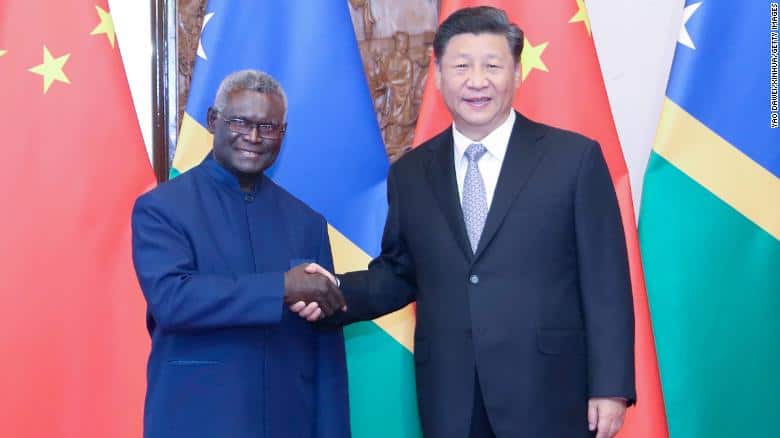Dr Anthony Bergin and Jeffrey Wall


The Solomon Islands security agreement with China is a significant setback for Australia and the region. In barely three years Solomon Islands has gone from supporting Taiwan to China’s most compliant Pacific partner. China’s security agreement was signed and proudly announced by China’s foreign ministry just before the high-powered United States delegation arrived in Honiara to argue against the Sogavare government signing-up. Too late: the deal was locked in.
In the short term, China might be satisfied with placing police officers in the country, supplying weapons and visiting ship berthing rights. But in the medium term we’ll likely see a flurry of Chinese activity in Solomon Islands from gold mining, investments in communications infrastructure, fisheries and no doubt China seeking to construct a military base, airfield or port facility in the island state.
In May a draft maritime co-operation agreement between China and Solomon Islands was disclosed. It says the countries will co-operate to establish “deep-sea fishing bases” and develop oil, gas and undersea mining ventures. This again shows how it is easy for China to infiltrate and destabilise small economies with promises of investment delivered directly, even though often not appropriate or an asset in reality. It also raises the prospect of the implied preferential extraterritoriality in the security agreement China has signed with Solomon Islands being invoked: it allows China to use its military ‘to protect the safety of Chinese personnel and major projects’.
There’s some hope China’s growing influence in Papua New Guinea might be slowed, if not reversed, depending on the PNG national elections mid-year. China sees PNG as more strategically important than Solomon Islands. That’s why the proposal for a major “fisheries facility” and port on Daru, the closest reasonably inhabited community to northern Australia, is promoted by the influential Chinese embassy in Port Moresby. Don’t be surprised if by the end of this year the multi-million dollar Chinese fishing and port facility on Daru is pushed up Beijing’s regional agenda.
There’s also an alternative to Daru close by that’s arguably a greater risk to Australia’s national security. The Kikori-Ihu special economic zone in Gulf Province has already secured a K90 million “grant” from China. That’s unusual given that China has shifted completely from grant aid to tied project support and loan funding. China has achieved quite cheaply a strategic advantage on our northern border, and in an undeveloped PNG Province which has enormous untapped gas, and probably oil, resources.
Australia needs to be watching closely what China might be planning for the southern PNG coast. Canberra should be lifting its infrastructure funding and services on Daru, and in the adjoining Western Province. The objective should be to give the people of Daru, upwards of 15,000, the same level of basic services that are enjoyed by the people of Thursday Island and the Torres Strait. This would deliver a body blow to any proposals China might have that would deliver no real improvement in basic services for the people of Daru.
The Solomon Islands debacle is now something only a change of government in Honiara can reverse. Australia should now focus on engaging with stakeholders in the island state interested in democracy and weakening ties with China, including provincial premiers, (the principled and dogged premier of Malaita has refused to follow the national government’s move in rejecting Taiwan), members of parliament and faith leaders who are concerned about the security agreement with China.
If free and fair elections are held on schedule in Solomon Islands next year, it’s quite possible a new government will come in and cancel the deal and even switch back to Taiwan. That would be a huge blow President Xi’s credibility. At the same time, we’ll need to be watchful that the Solomon Islands prime minister doesn’t engineer a false “security situation” to trigger the security arrangement and delay elections, which Sogavare could lose.
Australia needs to keep its focus on PNG, Bougainville, (that will offer China opportunities if it becomes independent), Fiji (a Pacific heavyweight) and Samoa, while keeping a close eye on Vanuatu, and Kiribati, (China’s interested in developing an airstrip on Kanton Island, the northern most island in the Phoenix group). Fiji has elections this year and if, as many observers expect, Fijian strongman and former prime minister Sitiveni Rabuka returns to power he’s vowed to oppose Beijing’s attempts to buy Fijian critical infrastructure.
It would make sense to have Australia’s Office of the Pacific, which manages our whole-of-government programs in the region from the Foreign Affairs and Trade department in Canberra, located as close as possible to the region. An idea worth examining is locating the Office of the Pacific in Cairns, or possibly Townsville or Brisbane. It would send a message to Australia’s neighbours that we’re taking our engagement with them more seriously.
Australia should also be developing much stronger links between our parliaments and the parliaments of the Pacific. Parliamentary democracy in our region is under constant challenge. Now is the time to look at how the federal parliament and our state parliaments, can mentor regional parliamentary staff and parliamentarians. It’s something the Chinese dictatorship would never be able to match. In the recent Australian election campaign billions were being promised. The sum total of these proposals would barely touch the sides.
Anthony Bergin is a senior fellow at the Australian Strategic Policy Institute. Jeffrey Wall has had a four-decade association with PNG, including as an adviser to several prime ministers.
